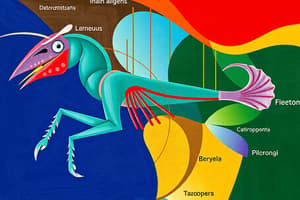Podcast
Questions and Answers
Why do biologists use classification to organize living organisms?
Why do biologists use classification to organize living organisms?
Biologists use classification to organize living organisms into groups so that the organisms are easier to study.
Who was Carolus Linnaeus and what did he do?
Who was Carolus Linnaeus and what did he do?
Carolus Linnaeus was a Swedish scientist who devised a system of naming organisms and developed a classification system based on observable features.
What is binomial nomenclature?
What is binomial nomenclature?
Binomial nomenclature is Linnaeus's naming system consisting of a two-part name, with the first part being the genus and the second being the species.
What are the seven levels of classification?
What are the seven levels of classification?
Which of the levels is the most specific and which is the least specific?
Which of the levels is the most specific and which is the least specific?
How do scientists classify different species?
How do scientists classify different species?
Who was Charles Darwin and what is he known for?
Who was Charles Darwin and what is he known for?
What is classification?
What is classification?
What is taxonomy?
What is taxonomy?
What is a eukaryote?
What is a eukaryote?
What is a prokaryote?
What is a prokaryote?
What are characteristics of the organisms in the Archaebacteria kingdom?
What are characteristics of the organisms in the Archaebacteria kingdom?
What are characteristics of the organisms in the Eubacteria kingdom?
What are characteristics of the organisms in the Eubacteria kingdom?
What are the characteristics of organisms in the Protists kingdom?
What are the characteristics of organisms in the Protists kingdom?
What are the characteristics of organisms in the Fungi kingdom?
What are the characteristics of organisms in the Fungi kingdom?
What are the characteristics of organisms in the Plantae kingdom?
What are the characteristics of organisms in the Plantae kingdom?
What are the characteristics of organisms in the Animalia kingdom?
What are the characteristics of organisms in the Animalia kingdom?
Which kingdoms are eukaryotic?
Which kingdoms are eukaryotic?
Which kingdoms are prokaryotic?
Which kingdoms are prokaryotic?
Which kingdoms are multicellular?
Which kingdoms are multicellular?
Which kingdoms are unicellular?
Which kingdoms are unicellular?
Which kingdoms are both unicellular and multicellular?
Which kingdoms are both unicellular and multicellular?
Which kingdom is autotrophic?
Which kingdom is autotrophic?
Which kingdom can be both autotrophic or heterotrophic?
Which kingdom can be both autotrophic or heterotrophic?
Which kingdoms are heterotrophic?
Which kingdoms are heterotrophic?
What is adaptation?
What is adaptation?
What is a scientific theory?
What is a scientific theory?
What are the factors that affect the process of natural selection?
What are the factors that affect the process of natural selection?
What is evolution?
What is evolution?
What is overproduction?
What is overproduction?
What is natural selection?
What is natural selection?
What is competition in the context of natural selection?
What is competition in the context of natural selection?
What is selection in the context of natural selection?
What is selection in the context of natural selection?
What is artificial selection?
What is artificial selection?
What is a scientific name?
What is a scientific name?
What is a fossil?
What is a fossil?
What is a common ancestor?
What is a common ancestor?
Flashcards are hidden until you start studying
Study Notes
Classification and Taxonomy
- Classification organizes living organisms into groups for easier study.
- Taxonomy is the scientific study of classifying living things.
- The classification hierarchy includes levels: Kingdom, Phylum, Class, Order, Family, Genus, Species.
Carolus Linnaeus and Naming Systems
- Carolus Linnaeus created a naming system called binomial nomenclature.
- Each organism is assigned a two-part scientific name: Genus (capitalized) and Species (not capitalized), both italicized.
Kingdoms of Life
- Six kingdoms: Archaebacteria, Eubacteria, Protists, Fungi, Plantae, and Animalia.
- Archaebacteria and Eubacteria are prokaryotic (lack a nucleus); all other kingdoms are eukaryotic (contain a nucleus).
- Plantae and Animalia are multicellular; Archaebacteria and Eubacteria are unicellular; Protists and Fungi can be both.
Characteristics of Kingdoms
- Archaebacteria: Exist in extreme environments like hot springs and acidic conditions.
- Eubacteria: Common bacteria living in neutral conditions with a different chemical makeup than archaebacteria.
- Protists: Diverse and can be animal-like, fungus-like, or plant-like; can be beneficial or harmful.
- Fungi: Decomposers that break down dead organic material; found primarily on land.
- Plantae: Primary producers that sustain heterotrophic life forms through photosynthesis.
- Animalia: Heterotrophic, mobile organisms with various adaptations for survival.
Biological Concepts
- Eukaryote: Organisms with cells that have a nucleus.
- Prokaryote: Organisms whose cells lack a nucleus.
- Multicellular: Organisms made of multiple specialized cells.
- Unicellular: Organisms composed of a single cell.
- Autotrophic: Organisms that produce their own food (e.g., plants).
- Heterotrophic: Organisms that rely on other sources for food (e.g., animals).
Evolution and Natural Selection
- Darwin's Theory of Natural Selection explains how species evolve over time through adaptation.
- The process involves factors like overproduction, variation, competition, and selection.
- Overproduction: Species produce more offspring than can survive, leading to competition for resources.
- Variation: Differences among individuals in a population; critical for natural selection.
- Adaptation: Traits that enhance survival or reproduction in a specific environment.
- Artificial Selection: Breeding organisms for desired traits.
Definitions and Important Terms
- Fossil: Preserved remains or traces of ancient organisms.
- Scientific Theory: A well-tested explanation for a range of observations or experimental results.
- Common Ancestor: Organisms exhibit similarities because they share a common ancestor.
Studying That Suits You
Use AI to generate personalized quizzes and flashcards to suit your learning preferences.




